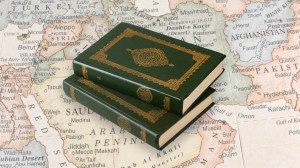In this series

The vast scale of the Southeast Asian region and its great diversity in ethnicity, culture, and religion mean that some of the most useful insights into Islam in Southeast Asia are gained from multi-authored works that present diverse perspectives and experiences. Such works are enhanced by several excellent studies of specific aspects of Southeast Asian Islam by individual authors.
Malay Muslims: The History and Challenge of Resurgent Islam in Southeast Asia, by Robert Day McAmis
Robert McAmis spent several decades serving as a Lutheran missionary among Malay Muslims in the Philippines. This fact alone makes his study valuable, as Philippine Muslim communities represent some of the most inaccessible—and at times volatile—targets for mission work. McAmis lived and breathed his Muslim context, and this is reflected in his book, which surveys the history, culture, Islamic practices, and connections within and without the Philippines.
McAmis wrote his book in the wake of the 9/11 attacks when so much discussion in the West revolved around trying to understand the mindset that produced the phenomenon of resurgent Islam. McAmis’s study seeks to answer those questions in the context of his particular Southeast Asian context in the Philippines. Yet his interest is not just Islam but also the dynamics of Christian-Muslim relations. He stresses the diversity of the Philippine Muslims whom he got to know and eschews any attempt to essentialize them. The reader gains a sense of the many dimensions of Muslim diversity.
Routledge Handbook of Islam in Southeast Asia, edited by Syed Muhammad Khairudin Aljunied
Syed Muhammad Khairudin Aljunied is a prominent specialist in the historical and contemporary manifestations of Islam in Southeast Asia. In this multi-author volume, Aljunied has gathered a veritable Who’s Who of scholars in the field of Southeast Asian Islam—both Muslim and non-Muslim—and the result is a volume with rich perspectives into diverse questions about Islam in the region.
The volume is arranged in three parts: Muslim Global Circulations, Marginal Narratives, and Refashioning Pieties. This allows for a genuinely multidisciplinary approach, addressing matters of history, politics, society, interreligious relations, gender, colonialism, Islamic resurgence, and much more.
Furthermore, this volume moves beyond the usual focus on the “Islamic heartlands” of Southeast Asia—namely, Indonesia and Malaysia—to also consider Islamic minorities in diverse settings such as Vietnam, Cambodia, Myanmar, Thailand, Singapore, and the Philippines. Another strength of the volume is the extent to which it includes Southeast Asian scholarly contributors, reflecting the fact that the center of gravity of expertise on Southeast Asian Islam has gradually moved from the West to Southeast Asia since the turn of the century.
Islamic Thought in Southeast Asia: New Interpretations and Movements, edited by Kamaruzzaman Bustamam-Ahmad and Patrick Jory
This volume also reveals the shift toward Southeast Asian expertise on Islam in the region. Edited by prominent Indonesian and Australian specialists, the book can be traced back to a workshop in 2007 that was designed to provide a platform for young researchers from Southeast Asia to explore key themes relating to Islam in the region. The volume therefore draws heavily on Southeast Asian contributors and was published at the University of Malaya, Malaysia’s oldest university.
The subjects covered include various currents within contemporary Islamic thought, the intersection of Islam and human rights, Islamic education, the dynamics between Islam and ethnic identity, the interplay between Islam and democratic politics, emerging “neo-Sufi” movements, the increasing impact of Islamic law, and Islam and liberalism. These are the themes that preoccupy political and social leaders in countries across the Southeast Asian region in the age of globalization.
Papers address the transmission of ideas from outside the region into Southeast Asia, considering prominent scholars in other regions such as Seyyed Hossein Nasr and Abdul Karim Souroush. While rich in scholarly detail, the volume is eminently readable, with a writing style that is very accessible to educated nonspecialists.
Islam in Southeast Asia: Negotiating Modernity, edited by Norshahril Saat
This is another multi-authored volume that focuses on Indonesia, Malaysia, and Singapore. It also traces its roots to a conference—in this case, one held in Singapore in 2015 to evaluate how Islamic ideas from other regions, especially the Middle East, impact the three countries. While Islam in Southeast Asia has traditionally been seen as moderate and Sufi-inclined, this volume puts that perception to the test.
Southeast Asian Islamic history contained periods of great tension between traditionalist and reformist groups, and this is no less the case today. This volume explores these tensions as increasing calls for Islamic law in some parts of Malaysia and Indonesia face resistance from Muslims who are not attracted by the more assertive, activist expressions of Islam. Again, the prevalence of Southeast Asian authors in this volume adds credibility to the book.
Beyond Our Walls: Finding Jesus in the Slums of Jakarta, by Anita Rahma
After the largely academic discussions of the previous recommendations, this final work addresses the “so what” for Christians. Anita Rahma and her husband have served in the slums of Jakarta for more than a decade, where they display incarnational mission at its best. The Rahmas live among the largely Muslim poor in one of Southeast Asia’s most challenging urban environments—so challenging that the Indonesian government is moving the capital to another island as rising sea levels submerge large parts of Jakarta (where the poor live).
But the Rahma family has stayed the course, sharing the love and compassion of Jesus among Indonesia’s poorest Muslim families and providing a message of hope as they struggle to eke out the most basic of livings. With its 20 short chapters, the book is hard to put down. Readers are taken on a memorable journey that is unimaginable for most in the West. It would be difficult to finish the book without feeling a compelling urge to participate in some way.
Read our authors’ bio in the series’ lead article, The Best Books for Understanding Islam and Connecting with Your Muslim Neighbors. (Other articles in this special series are listed to the right on desktop or below on mobile.)
















